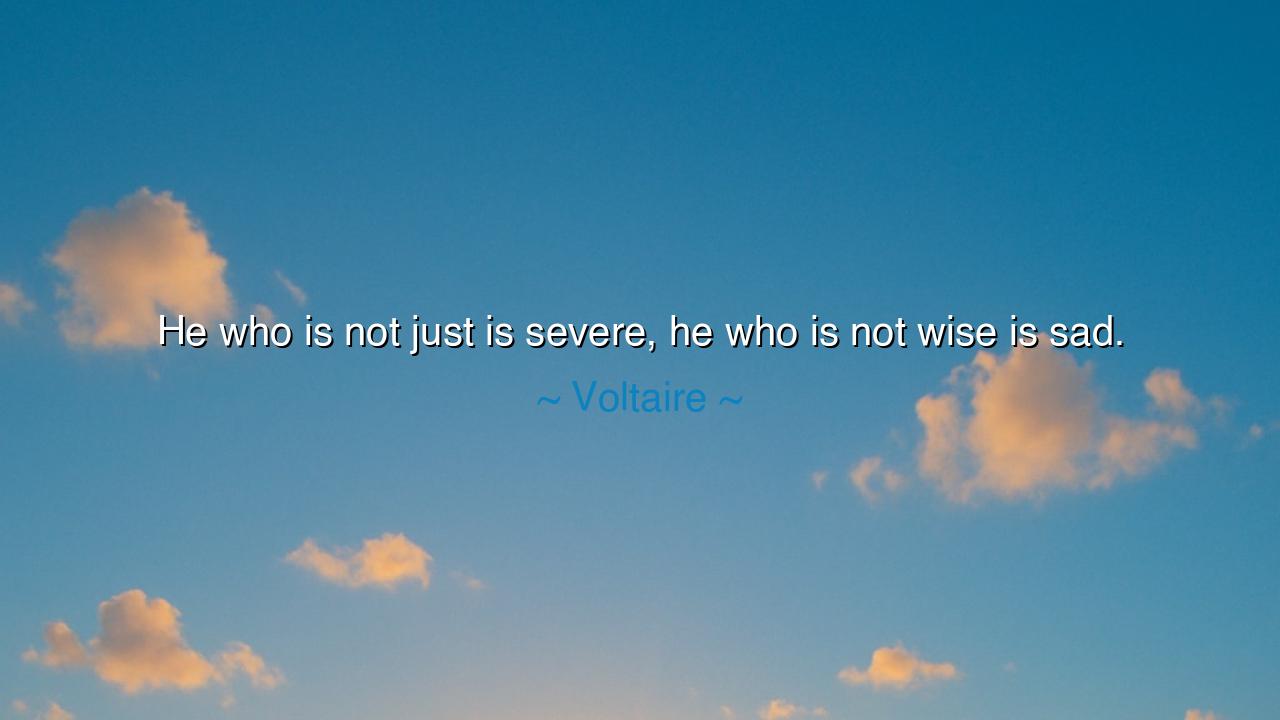
He who is not just is severe, he who is not wise is sad.






“He who is not just is severe, he who is not wise is sad.” — thus spoke Voltaire, the great voice of the Enlightenment, whose words, like lightning in a storm, struck through the clouds of ignorance and cruelty that shrouded his age. In this brief but piercing saying, he reveals two eternal truths about the nature of the human heart: that justice without compassion becomes tyranny, and that knowledge without wisdom becomes sorrow. It is a warning to all who would lead, teach, or judge — that power without fairness corrupts, and intellect without understanding breaks the soul.
To the ancients, justice and wisdom were not mere virtues but divine harmonies. The Greeks called Dike the spirit of justice, born of Zeus, and Sophia the spirit of wisdom, beloved of the gods. A man who lacked justice, they said, was not strong but disordered — like a storm that destroys what it should nourish. Voltaire, centuries later, saw the same truth in his own time: judges who punished without mercy, rulers who wielded authority without fairness. To be “severe,” in his words, is to be hardened by one’s own pride — to mistake punishment for order, and cruelty for strength. But true justice is never cruel; it corrects without humiliating, it disciplines without hate. The unjust man may seem powerful, but in truth he is brittle, for his harshness reveals the weakness of a spirit untempered by love.
Likewise, Voltaire’s second phrase — “he who is not wise is sad” — carries the weight of centuries of human reflection. For wisdom, unlike mere knowledge, is not the accumulation of facts but the understanding of life’s meaning. The unwise man may know much, but he sees little. He may achieve success, yet his heart remains restless. Without wisdom, knowledge becomes a burden; it shows him the vastness of the world but not how to live in it. Thus, sadness follows ignorance disguised as intelligence. The wise, however, accept imperfection with grace; they see beauty even in struggle, meaning even in loss. They walk through life not untouched by sorrow, but unbroken by it.
Consider the story of King Solomon, the ancient ruler who prayed not for power, nor for riches, but for wisdom to rule his people justly. His prayer was granted, and his reign became a symbol of harmony and insight. Yet even Solomon’s wisdom, when not guided by justice, led him astray — for when he strayed into pride, his peace turned to sorrow. His story reflects Voltaire’s twin truth: without justice, even wisdom leads to decay, and without wisdom, even justice turns cold. The two must walk together, as twin pillars supporting the temple of the human spirit.
Voltaire’s own life was a battle between reason and cruelty. He lived in a time when kings ruled without fairness, and when truth could cost a man his freedom. He fought with his pen against the severe and the ignorant alike, seeking a world guided by both justice and wisdom. His words remind us that severity is not strength but the failure of empathy, and that sadness is not destiny but the shadow cast when one’s mind lacks illumination. He knew that societies fall not from weakness, but from the absence of virtue in those who lead and those who judge.
There is also, hidden within his words, a call to humility. For to be just, one must first see beyond oneself — to weigh others with the same mercy one hopes for from the heavens. And to be wise, one must first listen — to the quiet lessons of life, to the sorrows of others, to the silence between triumphs. The severe heart is cold because it feels too little; the sad heart is heavy because it understands too late. Only the heart that unites fairness and wisdom can find peace within itself and give peace to others.
So, my child, remember this teaching as you walk through life: strive to be just, not severe; wise, not merely clever. When anger rises, temper it with understanding. When judgment tempts you, balance it with compassion. Seek not only to know, but to comprehend; not only to win, but to uplift. For justice without kindness will make you feared but never loved, and knowledge without wisdom will make you capable but never content. In the end, as Voltaire knew well, the soul that holds both fairness and wisdom walks closest to the divine — calm, radiant, and free from the sadness of ignorance and the cruelty of pride.






AAdministratorAdministrator
Welcome, honored guests. Please leave a comment, we will respond soon